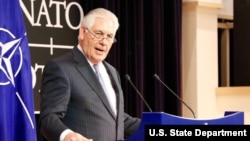The Latest on incidents in Cuba that sickened American diplomatic personnel (all times local):
7:25 a.m.
Secretary of State Rex Tillerson says the United States is convinced the incidents harming the health of U.S. Embassy workers in Cuba were "targeted attacks."
Tillerson is pushing back on Cuba's complaints that the U.S. hasn't shared enough information to let Cuban authorities investigate. He says the U.S. has shared some information but that he's put two restrictions in place.
Tillerson says he won't share information that violates individuals' privacy or reveals their medical conditions. And he says he won't release information that helps the perpetrator determine how effective the attacks were.
Tillerson says he understands the Cubans don't like the actions the U.S. has taken in response. But he says the United States doesn't like having its diplomats come under attack.
3:54 a.m.
Doctors treating the U.S. Embassy victims of mysterious, invisible attacks in Cuba have discovered brain abnormalities as they search for clues to explain the hearing, vision, balance and memory damage, The Associated Press has learned.
It's the most specific finding to date about physical damage, showing that whatever it was that harmed the Americans, it led to perceptible changes in their brains. The finding is also one of several factors fueling growing skepticism that some kind of sonic weapon was involved.
Medical testing has revealed the embassy workers developed changes to the white matter tracts that let different parts of the brain communicate, several U.S. officials said, describing a growing consensus held by university and government physicians researching the attacks. White matter acts like information highways between brain cells.




